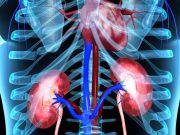Study Looks at Effects of Reducing Intake of Processed Meat, Unprocessed Red Meat
30 percent reduction in processed meat intake would lead to 352,900 fewer occurrences of T2DM, 92,500 fewer occurrences of CVD
Early School-Based Health Promotion Intervention Beneficial
Beneficial trends in z scores for waist-to-height ratio, waist circumference maintained at six years for those starting intervention in grade 1
Hyperbaric Oxygen Therapy Improves Physical Performance in Older Adults
Improvements seen in maximal oxygen consumption and oxygen consumption at the first ventilatory threshold
Body Composition Patterns Linked to Risk of Neurodegenerative Diseases
Lower rate of neurodegenerative diseases seen with 'fat-to-lean mass,' 'muscle strength,' 'bone density,' and 'leg-dominant fat distribution' patterns
Mediterranean Diet Aids Cardiovascular Health Measures in Children, Teens
Benefits seen on multiple cholesterol measures and systolic blood pressure, but not other metabolic markers
Digoxin, Beta-Blockers Have Equivalent Effects on Heart Rate in A-Fib
Wearable device data could predict New York Heart Association functional class similarly to clinical measures and six-minute walk test
Study Looks at Illness Trajectories After Revascularization in Patients With PAD
Amputation rate higher for nonelective patients, as is mortality rate at five years after revascularization
Evening Resistance Training Breaks Help Improve Sleep Outcomes
Benefits seen for sleep period and total sleep time, but not sleep quality
Sleep Apnea Increases Risk for Cardiovascular Risk Factors and Events
Findings even true in adults younger than 40 years of age
Digital Subtraction Angiography-Guided TDC Performance Superior
Performance of DSA-guided tunneled dialysis catheters is superior to ultrasound-guided TDC in renal replacement therapy



















